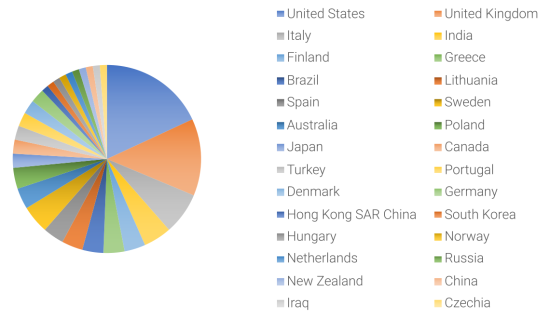Search Articles
Journal:
Highlights of Sustainability
Total
—
86 articles
Article 18 May 2023
Larry Dwyer
Highlights of Sustainability
Volume 2 (2023), Issue 2, pp. 83–99
Volume 2 (2023), Issue 2, pp. 83–99
10917 Views6958 Downloads14 Citations
Review 8 May 2023
Annette Toivonen
Highlights of Sustainability
Volume 2 (2023), Issue 2, pp. 75–82
Volume 2 (2023), Issue 2, pp. 75–82
6216 Views4786 Downloads5 Citations
Article 2 May 2023
Floros Flouros
Highlights of Sustainability
Volume 2 (2023), Issue 2, pp. 62–74
Volume 2 (2023), Issue 2, pp. 62–74
3578 Views1580 Downloads
Article 13 Apr 2023
Thomas Krabokoukis
Highlights of Sustainability
Volume 2 (2023), Issue 2, pp. 50–61
Volume 2 (2023), Issue 2, pp. 50–61
5357 Views1079 Downloads5 Citations
Article 7 Mar 2023
Olaniran Anthony Thompson, Agbotiname Lucky Imoize and Taiwo Timothy Amos
Highlights of Sustainability
Volume 2 (2023), Issue 1, pp. 35–49
Volume 2 (2023), Issue 1, pp. 35–49
3919 Views1292 Downloads3 Citations
Article 28 Feb 2023
Michele Sisto and Angela Cresta
Highlights of Sustainability
Volume 2 (2023), Issue 1, pp. 16–34
Volume 2 (2023), Issue 1, pp. 16–34
3977 Views1061 Downloads
Commentary 24 Feb 2023
Ada Rocha and Cláudia Viegas
Food service comprises the production of meals consumed outside the home, including consumers from all age groups and in different sectors, such as schools (from kindergarten to university), public and private companies, the health sector (from
Food service comprises the production of meals consumed outside the home, including consumers from all age groups and in different sectors, such as schools (from kindergarten to university), public and private companies, the health sector (from hospitals to elderly care institutions), military, sports facilities and restaurants (from fine dining to fast-food). Food service units (FSU) achieved importance and responsibility not only for feeding the population but also as an important setting for public health interventions, potentially educating consumers and modulating behaviours through the meals provided. In addition to its socioeconomic impact, the food service industry has a strong environmental impact. More sustainable food service starts with the basics: minimizing environmental impact by reducing carbon footprint. Food service industry is being encouraged to make choices that positively impact the environment. Nevertheless, most of the efforts and research made in the last years have been focused on evaluating and reducing food waste. This article focuses on strategies that could be implemented beyond food waste, and act on changing the food offer towards health and sustainability while promoting consumers’ behaviour change.
or
Access Full Article
Highlights of Sustainability
Volume 2 (2023), Issue 1, pp. 10–15
Volume 2 (2023), Issue 1, pp. 10–15
5108 Views1619 Downloads2 Citations
Short Note 10 Feb 2023
Simone Pettigrew and Leon Booth
Highlights of Sustainability
Volume 2 (2023), Issue 1, pp. 1–9
Volume 2 (2023), Issue 1, pp. 1–9
3533 Views1269 Downloads1 Citations
Editorial 22 Dec 2022
Highlights of Sustainability Editorial Office
Highlights of Sustainability
Volume 1 (2022), Issue 4, pp. 253–254
Volume 1 (2022), Issue 4, pp. 253–254
3261 Views628 Downloads
Article 6 Dec 2022
Julia Hillmann, Anne Bergmann and Edeltraud Guenther
This paper investigates the time-dependent effects of building organizational resilience. So far, empirical research only finds evidence that organizational resilience provides benefits in the long term. For the short and medium term, the link remains unclear.
This paper investigates the time-dependent effects of building organizational resilience. So far, empirical research only finds evidence that organizational resilience provides benefits in the long term. For the short and medium term, the link remains unclear. On the one hand, literature indicates that building organizational resilience is costly. On the other hand, actions to build organizational resilience are perceived by investors, which should provide immediate positive effects for companies. This study investigates these two assumptions in the climate change context. We apply multiple regression analysis to study the relationship between resilience capabilities and different measures of financial performance. For market value and financial volatility, our findings indicate that building organizational resilience provides immediate benefits. For the total stock return index, we find only benefits that materialize with a time lag. We find no evidence at all that building resilience capabilities is related to costs in terms of lower accounting-based financial performance. Overall findings indicate that building organizational resilience is advantageous as it prepares an organization to face the challenges of climate change and, at the same time, provides financial benefits.
or
Access Full Article
Highlights of Sustainability
Volume 1 (2022), Issue 4, pp. 233–252
Volume 1 (2022), Issue 4, pp. 233–252
6677 Views3924 Downloads3 Citations
